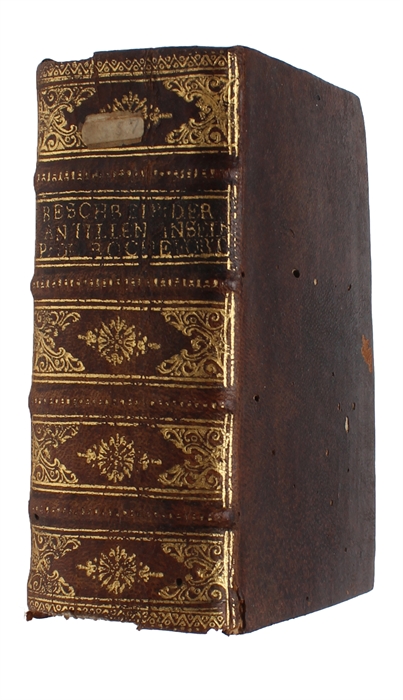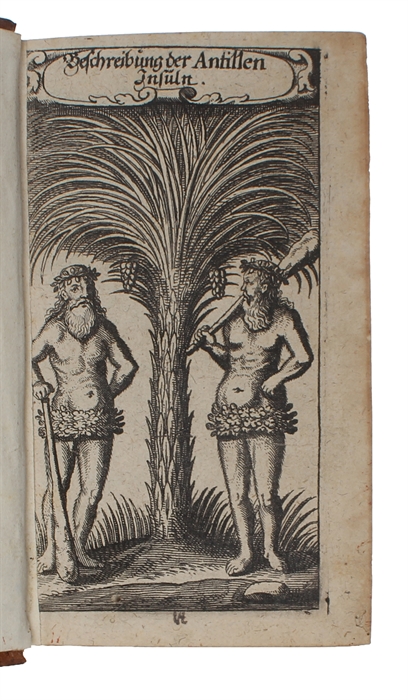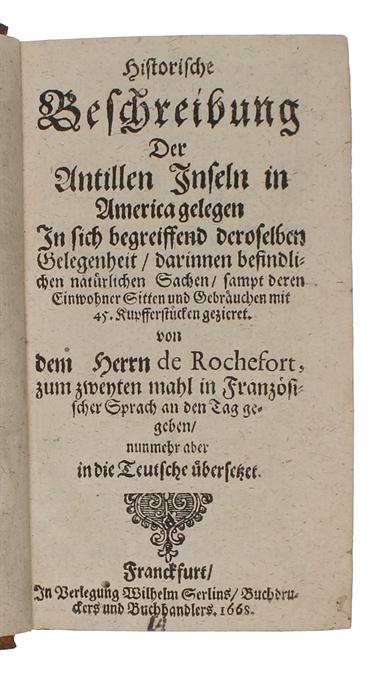EARLY WORK ON THE ANTILLE ISLANDS
ROCHEFORT, CHARLES DE.
Historische Beschreibung der Antillen Inseln. 2 part.
Frankfurt: Wilhelm Serlin, 1668.
12mo (140 x 85 mm). In contemporary full calf with four raised bands and gilt lettering and ornamentation to spine. Small paper label pasted on to top of spine indicating the inventory number in a estate library. A few worm holes to boards. Closely trimmed, a few leaves with slight loss of text to upper margin. Leaf pp. 389/390 with repair in margin, with loss of text, otherwise a nice copy. (20), 31, (3), 430, (14); (12), 514 pp. + frontispiece and 45 plates (as called for by Sabin).
Rare first German edition, here with the often lacking second part (“the second, which is generally lacking” – Sabin) of this early and important work on the Antilles Islands describing the customs and manner of the inhabitants - "The work is an important and valuable contribution to our knowledge of the Antilles... " (Sabin 72321). Rochefort's book was written for the principal purpose of convincing other Huguenots to emigrate to the Caribbean. It described the islands and the natives in glowing terms, to make the Antilles seem a desirable destination for Protestants living in a France that didn't want them and barely tolerated them. The first part of the text, beautifully illustrated with copperplates, showcases the flora of the New World, including pineapple, indigo, ginger, cocoa, coconut, palm trees, and tobacco. Additionally, depictions of various fish, birds, animals, and traditional costumes are also included. Notably, it includes a chapter on the Apalachee Indians of the southwestern United States and a Carib language glossary by Raymond Breton. “Charles de Rochefort, a French Huguenot minister and missionary, was born in 1605 and died in 1683. He spent at least a decade in the Caribbean, from 1636 to the mid- 1640s, on Tobago and what we now call St. Kitts, before returning to take up a post as minister at a Huguenot Church in Rotterdam, a position that he held the rest of his life. In 1658, a book was published in Rotterdam, called Histoire naturelle et morale des iles Antilles de l'Amerique. The only name mentioned in the preface was “M. de Rochefort”. For a long time, this was suspected to be either Cesar de Rochefort or the comte de Rochefort. But in 1992, a scholar convincingly demonstrated that the author was Charles de Rochefort, the Huguenot minister of Rotterdam. The missionary purpose notwithstanding, Rochefort was very good at describing the flora and fauna of the Antilles, especially the plants. And he provided attractive engravings of many of the tropical plants he described. We show several of those illustrations here. You will notice that Rochefort, unlike Piso, liked to depict natives interacting with the plants, which makes his engravings even more attractive, from an ethnological point of view.” (Linda Hall) This German translation is based on the second edition of the original French edition. Sabin 72321
Order-nr.: 60608



